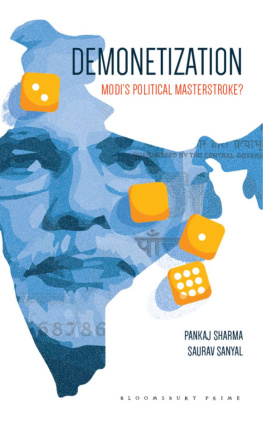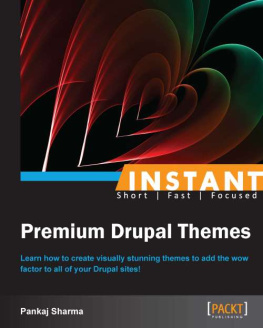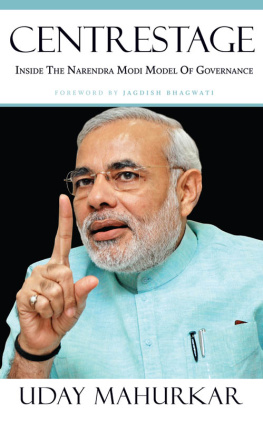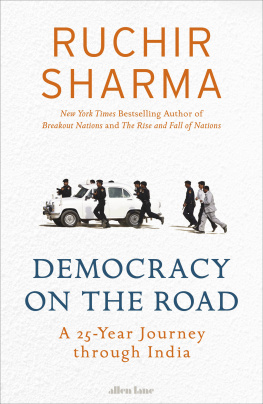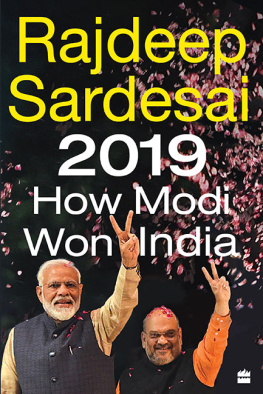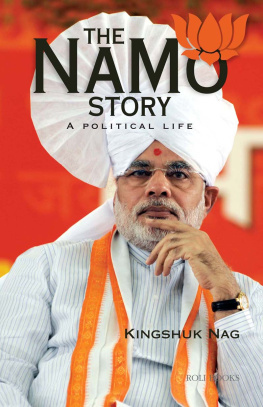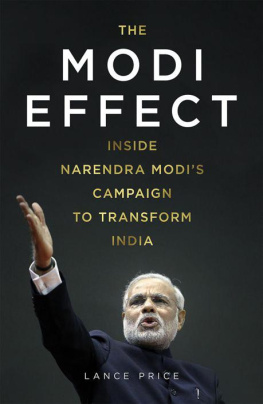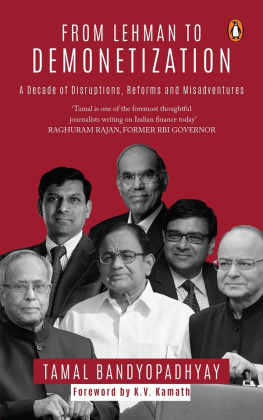Table of Contents

DEMONETISATION
MODIS POLITICAL MASTERSTROKE?
DEMONETIZATION
MODIS POLITICAL MASTERSTROKE?
Pankaj Sharma
and
Saurav Sanyal


Pankaj Sharma & Saurav Sanyal, 2017
First published, 2017
All rights reserved. No part of this publication may be reproduced or transmitted in any form or by any means, electronic or mechanical, including photocopying, recording, or any information storage or retrieval system, without prior permission in writing from the copyright holder.
No responsibility for loss caused to any individual or organization acting on or refraining from action as a result of the material in this publication can be accepted by Bloomsbury India or the author/editor.
BLOOMSBURY PUBLISHING INDIA PVT. LTD.
New Delhi London Oxford New York Sydney
ISBN: 978-93-88038-01-0
10 9 8 7 6 5 4 3 2 1
Published by Bloomsbury Publishing India Pvt. Ltd.
DDA Complex LSC, Building No. 4, 2nd Floor
Pocket 6 & 7, Sector C
Vasant Kunj, New Delhi 110070
Created by Manipal Digital Systems
The content of this book is the sole expression and opinion of its authors, and not of the publishers. The publishers in no manner is liable for any opinion or views expressed by the author. While best efforts have been made in preparing this book, the publishers makes no representations or warranties of any kind and assumes no liabilities of any kind with respect to the accuracy or completeness of the content and specifically disclaims any implied warranties of merchant ability or fitness of use of a particular purpose.
The publisher believes that the contents of this book do not violate any existing copyright/intellectual property of others in any manner whatsoever. However, in case any source has not been duly attributed, the publisher may be notified in writing for necessary action.
To the torch bearers of democracy, the ordinary Indian
We are immensely grateful to all the teachers, colleagues, professional associates, friends and family members who have not only influenced our thought process, knowingly or unknowingly, but also helped us in becoming who we are as people. There are so many of them that it would be virtually impossible to remember each and every one. Nevertheless, their contribution has been significant and deeply valuable to us. We have a deep sense of gratitude towards each and every one of them.
Specifically, we would like to thank the countless number of ordinary citizens of this country, interaction with whom forms the soul of this book. After this humbling experience, we genuinely believe that human goodness is not constrained by the artificial divisions based on social and economic status. We always found the man or woman on the street much more open, much less insecure and very helpful. These interactions also made us feel optimistic about the creativity, imagination, and initiative of an average Indian. We believe that with better education and improved standards of governance, it is possible for us to evolve into a more prosperous and humane society, and that too in a reasonable frame of time.
The support and co-operation from ones immediate family is an absolutely essential condition for an endeavour like this. Pankaj is thankful to his wife, Mrs Shikha Sharma, and his son, Pulin Sharma, for their patience and accommodating the enormous demand on Pankajs time this book had warranted during the background research, field survey and writing phase. Without the ardent support of Shikha and Pulin, this book would not have seen the light of day. Pankaj would be keen to acknowledge the contribution and encouragement received from so many people that the list below is really long, yet very much incomplete. The first for him to remember is his maternal grandfather, Late Shri Janardan Shastri, to whom he owes his love for reading and writing. His friends (Sandip Bansal, Saswat Sarangi, Sunil Teluja, Niraj Khare, Rupal Mehrotra, Ramesh Mantri, Sanjeev Soni and Unmesh Sharma), his teachers (Late Shri Kulwant Singh Sachdeva, Mahavir Sir, Sharma Madam, Bhupendra Sir, Rakesh Sir, Maheshwari Sir, Dr Gokarn, Dr Raheja, Dr Sha, Dr Ghosh, Dr Satsangi, Dr Narag, Dr Mitra, Dr Singla, Dr Pandit and Dr Kaur to name a few of them), his bosses at different points (Suhas Hari, Suresh Mahadevan, Venkatesh Balasubramaniam, Ashish Gupta, Ajay Garg, Gordon Gray and Kishore Gandhi), his solid support in this journey (Ranjan Sharma, Neeraj Sharma and Pushkar Shukla), and most importantly, his parents (Shri Kamlesh Kumar Sharma and Mrs Veena Sharma and Dr Ram Gopal Shukla and Mrs Mithlesh Shukla).
Saurav wishes to acknowledge the support extended by his father, Sanjib Kumar Sanyal, and mother, Ruma Sanyal, for giving him the freedom to exercise his choices in terms of his career as a researcher and business professional. He wishes to acknowledge the everlasting support of his wife Ms Sujata Sanyal, who has been a pillar of strength and son, Shubhraneel Sanyal, who always brings a new perspective to Sauravs life through his ideas and enthusiasm. He also wishes to acknowledge his family members, especially, Dr SS Chakravarti, Smt Sumita Chakravarti, Ms Shruti Chatterjee, Ms Rashi Chakravarti, Mr Gaurav Sanyal, Mr Supriyo Sanyal, and Dr Purandar Chakraborty, who kept the DNA of free thinking alive. He remains indebted to the indelible inspirations from Prof B Viswanathan (Emeritus Professor, IIT Madras), Prof JK Mitra (Former Dean, Faculty of Management Studies, Delhi University) and Prof V S Srinivasan (Ram Krishna Mission Vivekananda College, University of Madras), along with the inspiring faculty at the Department of Chemistry IIT Madras (1996-1998). A special thanks to his bosses on the professional side (Mr VM Naik, Mr Chander Mohan Sethi, Mr Monoj Chakraborty, Mr Aseem Soni, Mr Manish Gupta, Mr Saurabh Sharma and Mr Sander Verboom) and several close friends (Mr Anish Andheria, Mr Rakesh Kumar Singh, Mr VSN Anuj, Mr Sivaraman Dandapani, Mr B Arun Kumar) who made life an exciting journey every day.
We wish to acknowledge our sincere gratitude for Paul Vinay Kumar of Bloomsbury India Pvt Ltd, whose continuous support and encouragement made this book possible. We were never very good in making a realistic assessment of what the book was lacking but it was Paul, who helped us in the course correction.
From the evening of 8 November 2016, after the Government of India announced that the Rs 1000 and Rs 500 notes would cease to be legal tender in the next four hours, Demonetisation or the Note ban has been continuously in the news. The government has maintained that in the short term, demonetisation is bound to create some inconvenience for the people. However, it will also lead to the creation of a much cleaner economy in the medium to long run. The common people of India have shown exemplary discipline, even though it seems that the entire demonetisation exercise was neither well thought out, nor a meticulously planned exercise. The causes for which are shortage of required infrastructure, manpower for implementation and resources.
In terms of political reaction, while it was natural for the ministers and Government machinery to declare this as an extremely courageous and visionary move, the Opposition was left baffled for a while and without a proper response. Once the initial shock had subsided, the Chief Minister of Bengal, Ms Mamata Banerjee was a late joiner, but has remained more vocal on this issue.

